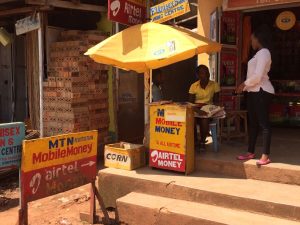CICO Agents: The under-valued “first responders”
by Nitish Narain, Abhishek Anand, Surbhi Sood and Shobhit Mishra
Apr 15, 2020
8 min
Our ongoing research uncovered a set of unique challenges that cash-in/cash-out (CICO) agents currently face in the context of the COVID-19 pandemic. Here, we look at the experience and behaviors of CICO agents across eight countries and explore ways to support them through favorable policies, even as the disease rages on around the world.
The Finance Minister of India announced a relief package worth INR 1,700 billion (or USD 22 billion) on 26th March, 2020 primarily to shield the poor during the on-going COVID-19 pandemic. Among several measures, the Finance Minister announced that approximately 200 million women account holders of the Pradhan Mantri Jan Dhan Yojana (PMJDY) would receive a credit of INR 500 (or USD 6.5) in their PMJDY accounts, monthly, for three months. The government relies on a cadre of a million-plus business correspondent agents, or cash-in/cash-out (CICO) agents, to ensure that the cash reaches the intended beneficiaries. Of these CICO agents, 60% are located in rural areas.
Governments the world over depend on CICO networks to deliver cash assistance in case of calamities. Between November, 2013 and February, 2014, using CICO agents, the Philippines government was able to quickly release USD 12.5 million of cash support for families affected by the Yolanda typhoon. The US government also utilized direct electronic transfer to offer cash assistance to communities during the Ebola epidemic in West Africa.
Given the importance of CICO agents, MSC is currently conducting a study to understand the impact of the COVID-19 pandemic on their businesses across eight countries in Asia and Africa. Specifically, we want to understand the impact on the demand for financial services through agents, agent operations, and their ability to support government cash transfer programs. We have also partnered with Caribou Digital to undertake a deep dive in Kenya.
Early evidence from our research points to the unique challenges that agents currently face and highlights the need to support them through favorable policies.
Dwindling demand for cash-in/cash-out
Fino Payments Bank, which has a network of over 100,000 CICO agents in India, reported an 80% decline in the volume of domestic remittances. This is likely because migrant workers, the key remittance senders, have returned to their homes once small businesses closed due to the nationwide lockdown. Worse still, they are stuck in large urban centers without any means of livelihood.
CICO agents in Kenya and Uganda also report low footfall due to social distancing and lockdown. “Business has always been good as I am strategically located in a high-traffic area and operate two outlets. But with the current situation, I have been forced to close one outlet because there are no customers”, says a CICO agent in Kenya. See our work with Caribou Digital for a more granular analysis of this based on quantitative data on transaction volumes and values at agents, and a series of additional qualitative interviews with agents.
In Indonesia, since the government offered relaxation on payment of utility bills, the footfall at agent outlets has reduced by up to 70%. “Because of the government’s waiver of the electricity bills, there are almost no electricity payments for March, 2020. Clients are happy, I am not”, says a rural CICO agent in Indonesia.
In India, however, the demand for cash-out from PMJDY bank accounts in rural areas has seen an upsurge due to the direct benefit transfer of INR 500 (<USD 7), in more than 200 million bank accounts. In Bangladesh, the government has allowed readymade garment (RMG) factories to continue operations even during the lockdown. Thus, there could be an increase in the disbursement of wages of such factory workers through CICO agents.
Erratic operations at agent outlets
The operations at CICO outlets across all the geographies studied continue to remain affected. In many countries where lockdown is imposed, law enforcement agencies are not allowing agents to operate. Many agents are also reluctant to open their outlets fearing that exchange of cash may lead to transmission of the disease. Customers are demanding a level of hygiene from agents, else they will not transact at the outlet.
Liquidity management challenge has aggravated
The liquidity management challenge is more pronounced in India due to the upsurge in cash-out transactions in rural areas. Several factors have made rebalancing cash difficult. These include the sudden demand for cash, restrictions on movement—even when CICO agents are exempt, the distance to bank branches that are often as far as 10-12 kilometers, shutting down of public transport, and lack of personal transport options for agents. The low daily transaction limit also means that the agents need to make multiple visits to the bank to rebalance. In some countries, agents have reported reducing their investment in liquidity to use the money and feed their families.
CICO agents in India
Agents have taken measures to cope with the pandemic
Focus on low physical touch in transactions
In Kenya, some agents are encouraging customers to use the “bill pay” function to make their purchases, despite the loss of commission on cash-out. In Indonesia, agents have also been prioritizing payment modes that involve “less physical touch”, such as using mobile phones over “physical touch-heavy” modes, such as biometric and PoS.
“I only use the POS machine to disburse G2P payments, not for regular transactions. I want to minimize any chances of disease transmission from touching the POS machine, debit cards, or food packages. For regular or daily transactions, I have been using the mobile application of the service providers instead of the POS device”, says a CICO agent in semi-urban Makassar, Indonesia.
In India, a few agents had voluntarily shut their outlets as their operations involved using tools and devices that required physical touch, such as POS devices and debit cards.
Strict adherence to social distancing and hygiene
A few rural CICO agents in India moved operations away from their homes, where they would usually conduct transactions, to the offices of the local government to limit exposure of their families.

CICO agents in Kenya & Uganda
Use of social media
CICO agents in Indonesia have started using social media for promotions. This has yielded some positive results as agents report that the daily customer footfall has started to increase.
“My business volumes have dropped up to 70-80% after Corona. I am making efforts to revive it by doing a lot of promotions on my Instagram and Facebook accounts. I have been able to attract between one to three new customers per day because of such promotions”, says a CICO agent in urban Jakarta.
Policy framework to support CICO agents
In many countries, the effective functioning of agent networks will be key for the governments to deliver cash support payments to the most vulnerable segments. Several governments have taken measures to help CICO agents offer uninterrupted service. The Government of India classified CICO agents under “essential services”, which allows them to operate even during the lockdown. The Bangladesh government increased the daily cash limit to facilitate high-value transactions at CICO outlets. Kenya increased cash limits and persuaded mobile money providers to waive fees.
However, many governments have announced and disbursed cash support payments with little warning and without considering the needs of agents in terms of crowd management, liquidity, and personal hygiene. There is a real risk of the cash support disbursed by agents becoming the vector for the disease to enter into vulnerable communities. Governments and mobile money operators will need to inform and train agents as role models for appropriate social distancing, hygiene, and protective behaviors. Monitoring mechanisms will have to be implemented to ensure compliance by agents. However, we are yet to see evidence of this. CICO agents are essential frontline workers. It will be good if governments and financial institutions equip them for this role.
Governments must work quickly with MNOs and banks to develop and implement a comprehensive policy framework to support CICO agents. The policy should include the following measures:
- Classify CICO business as an essential service. Since CICO networks are at the forefront of delivery of direct benefit transfers (DBT), the government should classify them as “essential services”. This will allow them to continue operations and help reduce the burden on traditional banking channels and prevent overcrowding. It may be time to review existing policies in countries such as Nigeria and Indonesia, where regulations limit the activities and reach of some types of agent networks or in countries such as Kenya, where G2P payments are made exclusively through bank agents.
- Focus on the health and safety of CICO agents. Together with banks and financial institutions, the governments should offer life insurance cover to CICO agents working during the pandemic. Agents should be provided with an adequate supply of masks, gloves, and hand sanitizers to safeguard them against the transmission of the disease. Agents should receive adequate training to ensure they understand the preventive measures, follow these when conducting transactions, and become role models for their customers.
- Offer special remuneration. The government should also offer enhanced commission payments for CICO agent networks that disburse cash support payments. Such remuneration should be linked to the performance of the agents to incentivize them to maintain adequate liquidity for the increased withdrawals in countries where governments have extended grant support. Governments should make the withdrawal of G2P payments economically viable for agent networks. Solely relying on the goodwill of banks and hard-pressed frontline agents can work in the short term but in the long term, it may lead to client harassment or overcharging, or both.
- Ensure better coordination across government agencies and service providers. Evidence from India and elsewhere suggests that while the government allows agents to operate, local law enforcement agencies are not aware and agents have often been forced to shut their outlets. Government authorities should work with service providers to ensure up-to-date information on all necessary permissions to operate are communicated to the relevant authorities.
- Actively provide liquidity management support. Governments should stagger cash support payments and service providers should take up the role of cash rebalancing actively to minimize the need for agents to travel. The government should also compensate service providers adequately to offset the additional cost incurred on liquidity management for agents.
[As things unfold and the world gradually moves to curtail the pandemic, watch this space for a series of blogs that analyze the experience and behaviors of CICO agents. Meanwhile, MSC is keeping a close eye on the ground to provide policymakers, banks, and agent network managers with evidence-based analysis to aid decision-making.]
Written by

Nitish Narain
Specialist
Abhishek Anand
Partner
Surbhi Sood
Senior Manager
 by
by  Apr 15, 2020
Apr 15, 2020 8 min
8 min
Leave comments